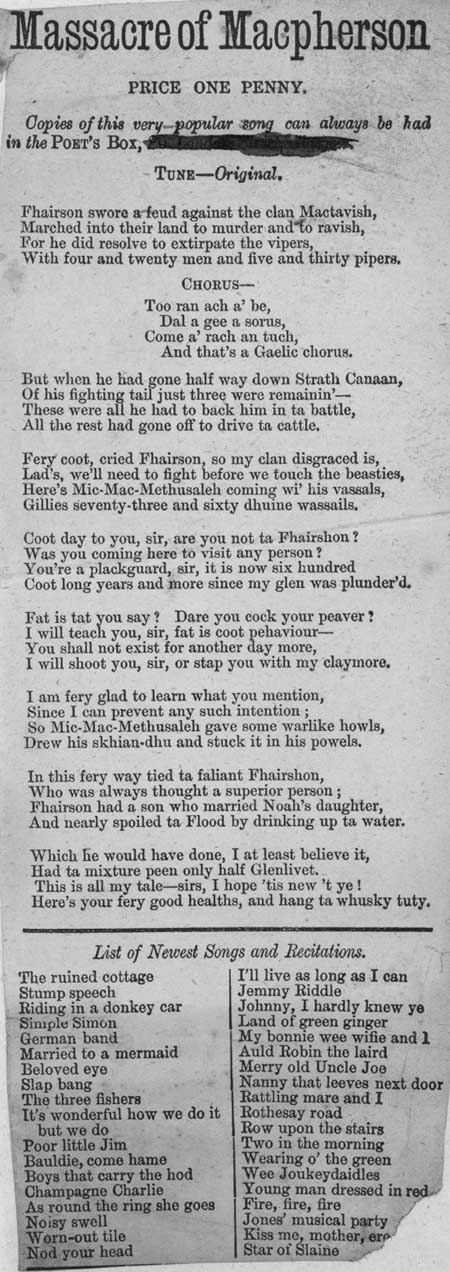Commentary
Verse 1 and chorus: 'Fhairson swore a feud against the clan Mactavish, / Marched into their land to murder and to ravish, / For he did resolve to extirpate the vipers, / With four and twenty men and five and thirty pipers. / Too ran ach a' be, / Dal a gee a sorus, / Come a' rach an tuch, / And that's a Gaelic chorus'. This ballad was to be sung to an 'Original' tune. The broadside was priced at one penny and published by the Poet's Box in Glasgow. At the foot of the sheet is a 'List of Newest Songs and Recitations' available from the publisher. This ballad derives its humour from Lowland perceptions of Scottish Highlanders. Highland pronounciation of English is rendered with comical exaggeration. The stereotypes of Highlanders being warlike and brave, but also dedicated cattle drovers, are combined to humorous effect when MacPherson's men desert him to go and drive the cattle, leaving him to be killed. The Highlander's alleged prediliction for whisky is also mocked. While authors like Walter Scott and James MacPherson romanticised the Highlands, satire like this was also common, even in the work of famous poets like Robert Fergusson.
The Poet?s Box in Glasgow operated from 1849 to 1911. Matthew Leitch was the proprietor at 6 St. Andrew Lane?s, a narrow street on the south side of Gallowgate, from 1850 to 1858. His son William Munsie Leitch worked at the same address from 1859 to 1865 and at varous addresses in London Street until 1911. Many of the broadsides published by the Glasgow Poet?s Box were dated and some carried advertisements, not just for printed items but also for shoe blacking and ?soap for lovers?! Like the other ?boxes? in Dundee and Edinburgh, the Glasgow one sold love songs, sea shanties, parodies and dialogues. It is not clear what the connection between the different Poet?s Boxes were. They almost certainly sold each other?s sheets. It is known that John Sanderson in Edinburgh often wrote to the Leitches in Glasgow for songs and that later his brother Charles obtained copies of songs from the Dundee Poet?s Box. There was also a Poet?s Box in Belfast from 1846 to 1856 at the address of the printer James Moore, and one in Paisley in the early 1850s owned by William Anderson.
Early ballads were dramatic or humorous narrative songs derived from folk culture that predated printing. Originally perpetuated by word of mouth, many ballads survive because they were recorded on broadsides. Musical notation was rarely printed, as tunes were usually established favourites. The term 'ballad' eventually applied more broadly to any kind of topical or popular verse.
View Transcription | Download PDF Facsimile
|
 |
Probable period of publication:
1880-1900 shelfmark: L.C.Fol.70(38b)
 View larger image
View larger image
|


